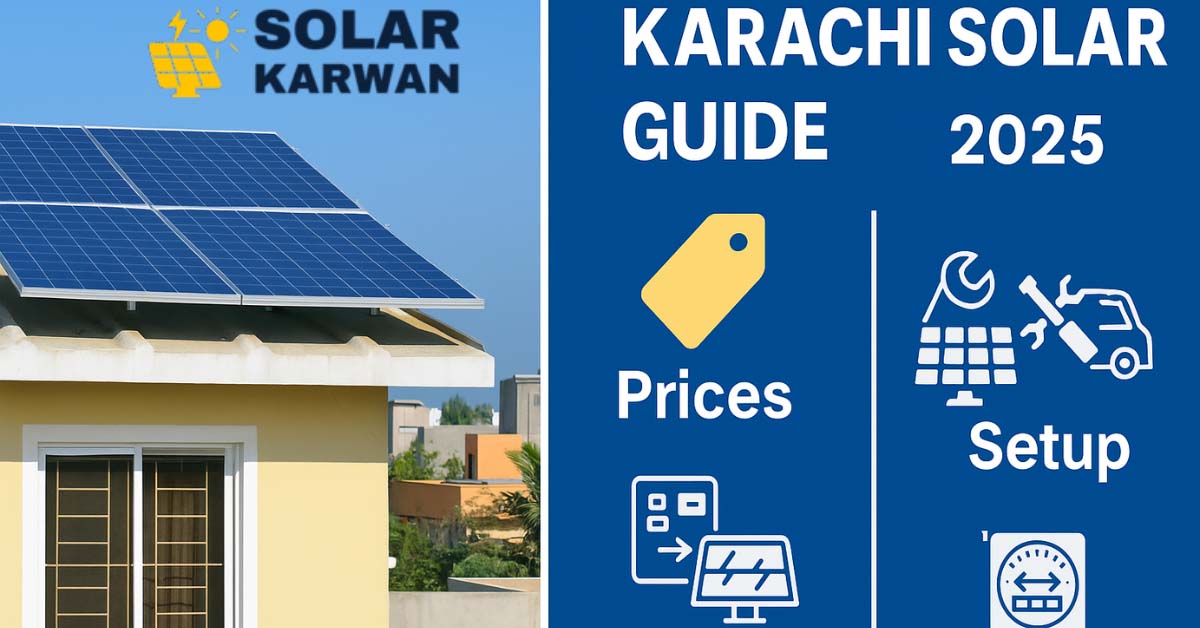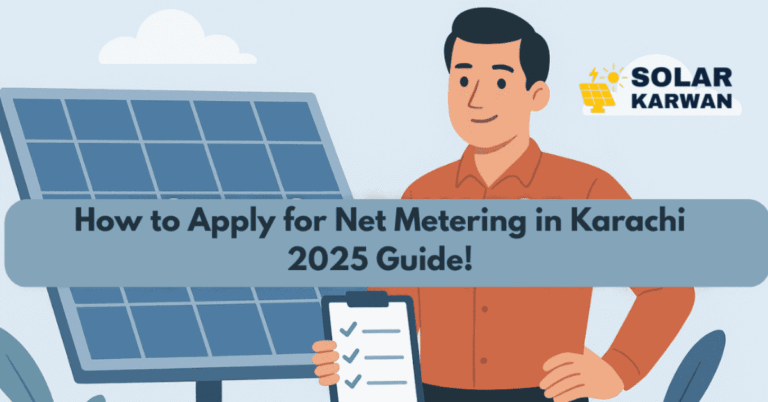Electricity bills in Karachi are rising every month, and so is the frustration. Frequent load-shedding, high unit rates, and power cuts have made it harder than ever for families and businesses to manage their energy needs.
However, 2026 presents a significant opportunity: solar energy is now more affordable and accessible than ever before. From small homes to large offices, people all over Karachi are switching to solar to take control of their energy costs, and Solar Karwan is here to help you do the same.
In this guide, we’ll walk you through:
- 🔆 What Is Solar Energy & Why Does It Matter in Karachi?
- 💰 Solar Panel Prices in Karachi (2026 Update)
- 🔌 Types of Solar Systems in Karachi: On-grid, Off-grid & Hybrid
- 💸 Solar Payback & ROI in Karachi: What to Expect
- 🔁 Net Metering & Net Billing in Karachi: Sell Back, Save More (2026 Update)
- ✨Say Goodbye to High Bills — Say Hello to Solar with Solar Karwan!
- FAQs
By the end of this article, you’ll know everything you need to start your solar journey with us
🔆 What Is Solar Energy & Why Does It Matter in Karachi?

Solar energy comes from the sun. With the help of solar panels, we can turn this sunlight into electricity to power homes, shops, schools, and offices.
It’s clean, renewable, and cost-saving—especially in a sunny city like Karachi. Once you install a solar system, your electricity comes straight from the sun. No fuel. No rising bills. No daily tension about load-shedding.
🌞Why are more people choosing Solar in 2026?

Solar isn’t just a trend in Karachi anymore—it’s a smart lifestyle change.
More families, shop owners, and even schools are turning to solar for long-term savings, peace of mind, and cleaner energy.
But why exactly are so many people making the switch in 2026? Let’s take a closer look:
| 🌞 Reason | ✅ What It Means |
|---|---|
| Reliable | No more power cuts or load-shedding stress. Solar gives you steady electricity day and night (with battery). |
| Affordable | You pay once for installation and enjoy savings every month for up to 25 years. |
| Eco-Friendly | Clean energy with no smoke, noise, or pollution—good for your family and the planet. |
| Smart Investment | Adds value to your property and pays for itself in just 2–3 years in most Karachi homes. |
Today, with improved technology and declining solar panel prices, solar energy is no longer just for factories or large buildings. Even a small home in Gulshan or Nazimabad can be powered by solar energy.
In Karachi, where sunlight is available almost year-round, solar isn’t just an option; it’s the smart move.
💰 Solar Panel Prices in Karachi (2026 Update)

If you’ve been considering installing a solar panel system but feel confused about pricing or have heard rumors that it’s too expensive, don’t worry—you’re not alone, and there are options available that may surprise you.
In 2026, solar panel prices in Karachi have become much more affordable. Thanks to local suppliers, easier imports, and growing competition, you can now get a reliable system without breaking your budget.
Below is a helpful price guide based on average market rates in Karachi this year.
📃NOTE: These prices are subject to market rates in Karachi. These are just estimates to give you an idea. The actual price can vary based on the brand, installation quality, and what type of system you choose (on-grid, off-grid, or hybrid).
📊 Karachi Solar Price Chart (Per System Size)
Here’s a quick look at estimated solar system prices in Karachi based on common home sizes and energy needs.
However, keep in mind that these are just approximate figures.
📌 These prices include panels, inverter, batteries (if hybrid or off-grid), and installation.
What Affects the Price?
Solar system prices in Karachi can vary due to multiple factors. Before you get a final quote, it’s important to understand what factors are affecting the cost.
| 🔍 Factor | 📌 Impact |
|---|---|
| System Type | On-grid systems are usually cheaper. Hybrid and off-grid systems cost more because they include batteries and extra components. |
| Battery Choice | Lithium-ion batteries last longer but are more expensive. Lead-acid batteries cost less but require more maintenance. |
| Brand & Warranty | High-quality brands offer better performance and longer warranties, which increases upfront cost but ensures long-term savings. |
| Installation Site | Rooftop angle, wiring, and structural changes can add to the total cost depending on your home or building layout. |
🔌 Types of Solar Systems in Karachi: On-grid, Off-grid & Hybrid

Not all solar systems are built the same. The right type for your home depends on how much electricity you use, whether you face load-shedding, and whether you want battery backup or not.
Let’s break down the main types of solar systems you’ll find in Karachi, and which one might be the best fit for your needs.
- On-grid: Connected to K-Electric. You use solar during the day and grid electricity when needed. It’s the most affordable option.
- Off-grid: Fully independent. No link to the power grid. You’ll need batteries to store solar energy for night use.
- Hybrid: Best of both worlds. Uses solar, grid, and batteries. Works even during load-shedding and helps save the most in the long run.
| Feature | On-grid | Off-grid | Hybrid |
|---|---|---|---|
| Connected to K-Electric? | ✅ Yes | ❌ No | ✅ Yes |
| Works during load-shedding? | ❌ No | ✅ Yes | ✅ Yes |
| Needs battery? | ❌ Optional | ✅ Yes | ✅ Yes |
| System cost | 💰 Lowest | 💰💰 Medium | 💰💰💰 Highest |
| Best for… | Homes/offices with stable grid | Remote areas or no grid | Users who want full backup + savings |
💬 Solar Karwan Tip:
If you’re in Karachi, where K-Electric is available but load-shedding is still a concern, many families choose a hybrid system for peace of mind. We can help you find the best fit based on your needs and budget.
💸 Solar Payback & ROI in Karachi: What to Expect

One of the biggest benefits of going solar is how fast it pays you back.
In Karachi, most solar systems recover their cost in just 2 to 3 years through monthly electricity bill savings.
💡 Real Example:
If you install a 5kW system for around Rs. 700,000 and save Rs. 20,000/month on bills:
📉 Payback Period = 700,000 ÷ 20,000 = 35 months (just under 3 years)
After that, the electricity your system produces is free for the next 20+ years.
That’s how solar gives you a strong Return on Investment (ROI). You spend once, and keep saving for decades.
🔁 Net Metering & Net Billing in Karachi: Sell Back, Save More (2026 Update)

Current Status: Significant Policy Shift (Effective Late 2025/Early 2026)
For years, “Net Metering” allowed Karachiites to trade electricity with K-Electric on a 1-to-1 unit basis. However, as of 2026, the government has transitioned towards a “Net Billing” model for new solar applicants.
While the concept remains the same, you generate your own power and send the excess to the grid, the financial rates have changed.
How the New “Net Billing” Works (2026)
Instead of simply subtracting your exported units from your imported units, the system now calculates the value of electricity:
- Import (What you take from KE): You are charged the standard grid tariff (approx. Rs. 55 – 65 per unit depending on your slab and fuel adjustments).
- Export (What you sell to KE): Your excess solar power is bought back at a fixed rate, currently set at Rs. 10 – 11 per unit (reduced from the previous ~Rs. 27).
The Result: Your exported units create a “Credit Amount” in Rupees, which is deducted from your bill. Because the buyback rate is lower than the import rate, self-consumption (using solar power directly during the day) is now the smartest way to save money, rather than just exporting everything.
Note for Existing Users: If you already have a valid Net Metering license from before the policy change (late 2025), you are typically protected at the older, higher rates for the remaining duration of your contract (usually 5–7 years).
| Transaction Type | Rate (Per Unit / kWh) |
| Buying from Grid (Import) | Rs. 55 – 65 (Peak/Off-Peak avg) |
| Selling to Grid (Export) | Rs. 10 – 11 (New Fixed Rate) |
| Old Buyback Rate | ~Rs. 27 (Only for old, protected licenses) |
How to Apply for Net Metering in Karachi (Step-by-Step)

Now that you know what net metering is, let’s talk about how to actually get it seThe application process is technical and must be handled by a licensed professional. You cannot apply as an individual.
Step 1: Hire an AEDB-Approved Vendor You must choose a solar installer who is certified by the Alternative Energy Development Board (AEDB). They will handle all documentation, engineering design, and coordination with K-Electric.
Step 2: Load Assessment Your vendor will check your “Sanctioned Load” on your KE bill.
- Rule: Your solar system size cannot exceed your sanctioned load.
- Solution: If you want a bigger system (e.g., 10kW) but your sanctioned load is low (e.g., 5kW), you must apply for “Load Regularization” with KE first.
Step 3: Submit Application Your vendor submits the file to K-Electric’s Net Metering Facilitation Centre (often at Civic Center). Documents include:
- CNIC of the property owner.
- Latest Electricity Bill (Paid).
- Technical Data of Inverters/Panels (Certifications).
- Single Line Diagram (SLD) of the electrical setup.
Step 4: K-Electric Inspection & NOC KE teams will visit your home to verify the installation standards (earthing checks, breaker quality, etc.). Once approved, they issue a NOC (No Objection Certificate) and a “Demand Note” (challan) for the meter fee.
Step 5: Pay Meter Fee & License Issuance You pay the fee for the Bi-Directional Meter (Green Meter). KE then sends your case to NEPRA for the Generation License.
Step 6: Meter Installation & Activation Once the license is ready, KE installs the Green Meter at your property.
- Total Timeline: Currently taking 60 to 90 days (2–3 months) due to high demand.
Is It Still Worth It?
Yes. Even with lower buyback rates, solar eliminates the most expensive part of your bill, daytime usage. By adding batteries (Hybrid System), you can store that cheap solar power to use at night, minimizing what you buy from K-Electric at Rs. 60+.
Required Documents

Getting your documents right is the key to avoiding delays.
Here’s a quick breakdown:
| For Homeowners | For Business Owners |
|---|---|
| CNIC copy (front & back) | CNIC copy (owner/director) |
| Proof of ownership (property tax bill or registry) | Business registration certificate (NTN/SECP) |
| Latest KE electricity bill | Latest KE bill of the premises |
| Solar system design & interconnection diagram | Solar system design & interconnection diagram |
| Equipment specification sheets | Equipment specification sheets |
| Licensed installer details | Licensed installer details |
| _ | NOC from Electrical Inspector (if required) |
| _ | Load flow study (if system >250 kW) |
✨Say Goodbye to High Bills — Say Hello to Solar with Solar Karwan!

Solar isn’t just for the future anymore; moreover, it’s the smartest choice for Karachiites today. With rising electricity bills, load-shedding, and the need for cleaner energy, switching to solar in 2026 just makes sense.
At Solar Karwan, we guide you every step of the way—from helping you choose the right system to saving money from day one.
Have questions? Need a price estimate for your home?
📞 Contact us now for a free quote or consultation. One call could change your energy future.
🌟 Solar Karwan — apni roshni ka karwan khud bano!
FAQs

1. Should I choose lithium batteries or tubular batteries for my solar system?
Lithium batteries are more efficient, compact, and longer-lasting—but also more expensive. Tubular batteries are budget-friendly but need regular maintenance. For long-term use and less hassle in Karachi’s heat, lithium is usually worth it.
2. Which are the best solar inverter manufacturers?
Some top inverter brands trusted in Karachi include Growatt, GoodWe, Inverex, Fronius, and Huawei. Your choice depends on budget, system type, and warranty needs. We can help recommend one that fits your home.
3. Which solar panels are the best for Karachi?
For Karachi’s hot, dusty climate, Tier 1 panels like Longi, JA Solar, Jinko, and Canadian Solar are highly recommended. They offer durability, good heat resistance, and strong warranties.
4. What types of solar systems are there?
- On-grid: Works with the electricity company, no backup during power cuts
- Off-grid: Fully independent, needs batteries
- Hybrid: Combines both—backup during load-shedding and credits from the grid
5. How much roof space do I need for solar panels?
One panel needs about 20–25 sq. ft. A 5 kW system may need 250–300 sq. ft. of clear, sunny space.
6. Do solar panels need protection from rain or dust?
No extra covers are needed. Panels are made to handle Karachi’s weather. Just clean every 10–15 days to remove dust and droppings.
7. What is net metering and how does it work?
Net metering lets you send extra solar electricity to the K-Electric grid and get credit on your bill. You give when you have extra and take when you need it—saving you money every month.
8. Can I monitor my solar system performance on my phone?
Yes! Most modern inverters come with mobile apps that let you track your power generation, usage, and savings in real-time—from anywhere.
9. Can I trust Solar Karwan with my solar setup?
Yes, our team includes qualified electrical engineers and certified solar professionals. We follow safety standards and offer full guidance—from first questions to final setup. Just message us—we’re here to help!
📞 Call us anytime at +92-324-2214498





